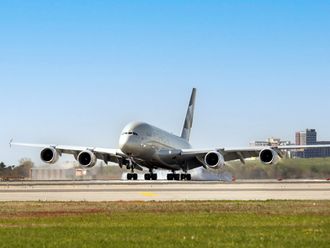Dubai: Emirates airline is not ready to resume its fuel hedging policy but is considering its position almost daily as it monitors price changes.
Emirates put an end to its fuel hedging strategy in 2009 and is currently feeling the benefits of low oil prices.
But with a sustained weak oil price the airline is considering its position “just about every day”, Gary Chapman, who is President of dnata and also responsible for Emirates’ hedging policy, told Gulf News on Wednesday.
With benchmark Brent crude trading at around $48 a barrel this week, down from last summer’s high of $115, the low oil price is helping airlines cut losses and some achieve record profits.
“We will continue to reassess the position because with the [oil] prices where they are … you’ve got to ask the question how long will they stay here and will they go higher and at what point? That review is constantly ongoing,” Chapman said in an interview at the Emirates Group headquarters in Dubai.
In 2009, the airline wrote down Dh1.57 billion in losses stemming from fuel contracts it signed just before the global financial crisis that stripped oil prices.
Emirates has also warned that while they may be benefiting from low oil prices, its bottom line is being hit by weak currencies in Europe, Russia and elsewhere. Middle East carriers are also susceptible to regional instability with many airlines now flying longer routes over Iran to avoid the threat of Da’esh in Iraq.












